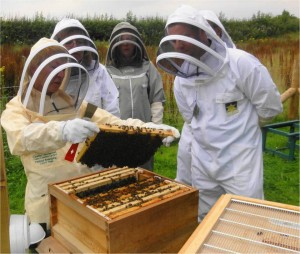 A campaign is being launched to encourage more people in Wales to take up beekeeping, following devastating losses to the country’s best-known pollinator.
A campaign is being launched to encourage more people in Wales to take up beekeeping, following devastating losses to the country’s best-known pollinator.
Latest figures showed a sharp drop in bee numbers following the winter of 2012/13, with 45 per cent of colonies lost. While early indications suggest a good recovery in numbers, it’s still early days.
Holly Pinkney, project manager for the National Beekeeping Centre Wales said: “We have seen a significant reduction in the numbers of honeybees and want everyone to understand how they can play a part in boosting numbers. Beekeeping really is the perfect, low maintenance hobby; just an hour a week is enough in peak season to manage two hives.
“Each hive is able to produce around 30 jars of honey per year, so it is an ideal hobby for people who care about fresh, healthy food, enjoy gardening or want to play their part in protecting one of our most important pollinators.”
Holly added that the National Beekeeping Centre for Wales apiary had a ‘flying start’ to spring, but experts were still keeping a close watch on their ‘bee cam’.
The centre, which has a visitor information point and store near Bodnant Welsh Foods, has set up a series of courses and events for budding beekeepers.
These range from ‘Meet the Bees’ tours, to taster days and intensive weekends. There is also a new beginner bee club, to help those starting out in the craft and workshops demonstrating how to create beauty products and candles from a hive’s resources.
With its farming industry, and large parts of the country used for grazing, Holly explained that, despite its mild climate, many parts of Wales are great for beekeeping. While, contrary to common belief, the hobby doesn’t require acres of land.
“A hive is quite small and can fit into the most restricted outdoor space, there is even a website where people can get in touch with landowners who are happy to host a hive,” Holly said.
“We have an active community of beekeepers, a huge amount of free information at our visitor centre and our volunteers are always happy to offer advice in person or over the phone.”
For more information on the National Beekeeping Centre for Wales and its beginner courses go to www.beeswales.co.uk.
Beekeeping facts and figures
- Honeybees account for 80 per cent of all insect pollination, collecting approximately 30kg (or 66lbs) of pollen, per hive, per year.
- Without bee pollination we would see a significant decrease in the yield of fruits and vegetables.
- Honey has antibacterial qualities and eating local honey is believed to help fend off allergies.
- The UK population loves honey – we are the third largest importer of honey products in the world – but produce just 20 per cent of our own consumption.
- There are estimated to be around 2,750 beekeepers in Wales and around 20 bee farmers with 40 or more colonies, and no more than 10 commercial beekeepers.
- Across the UK, there are approximately 300 commercial bee farmers and more than 33,000 who keep bees as a hobby.
- Beekeeping is a practice that has declined over the past century, with the number of hives today estimated to be just a quarter of those there were in 1900.
 Latest Tweets
Latest Tweets